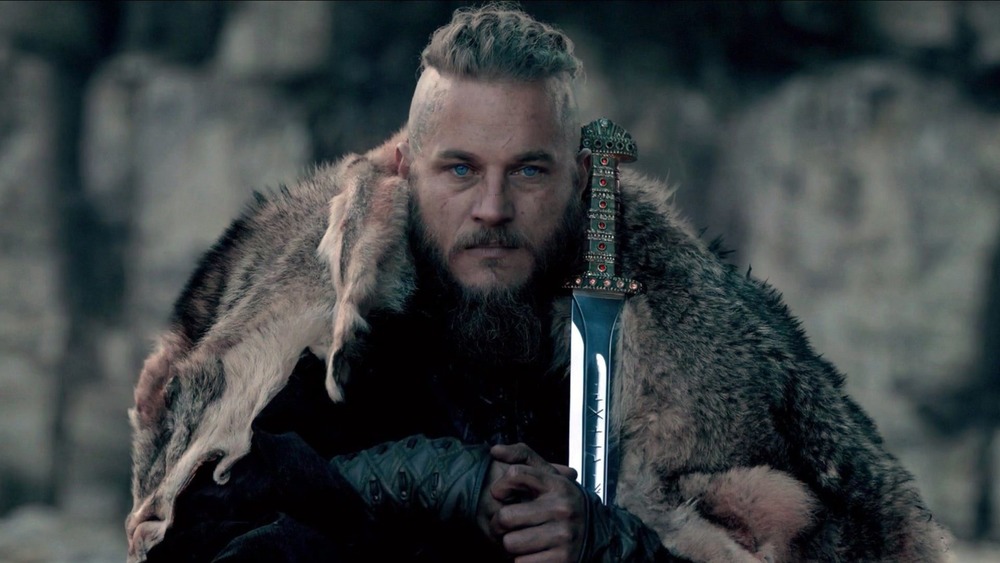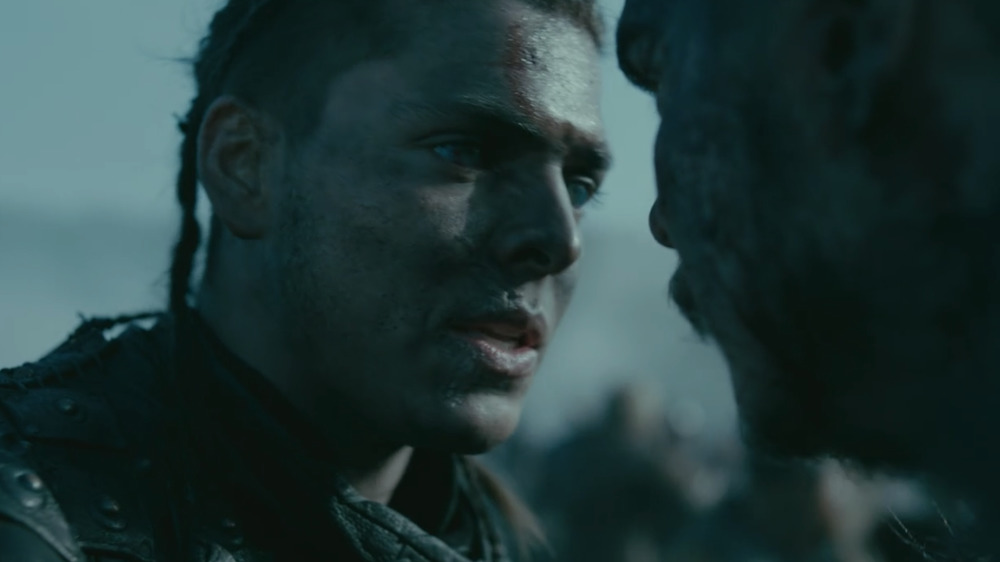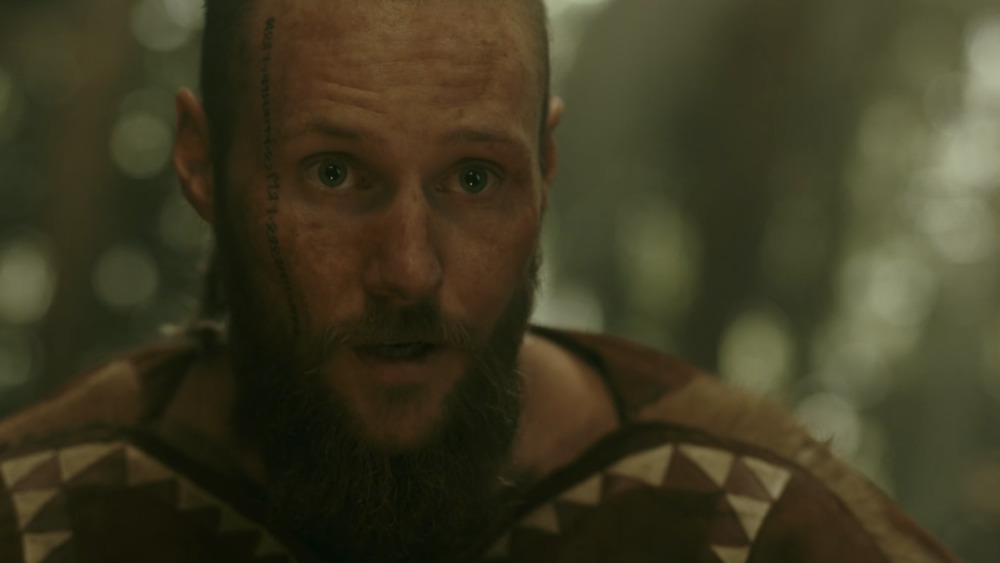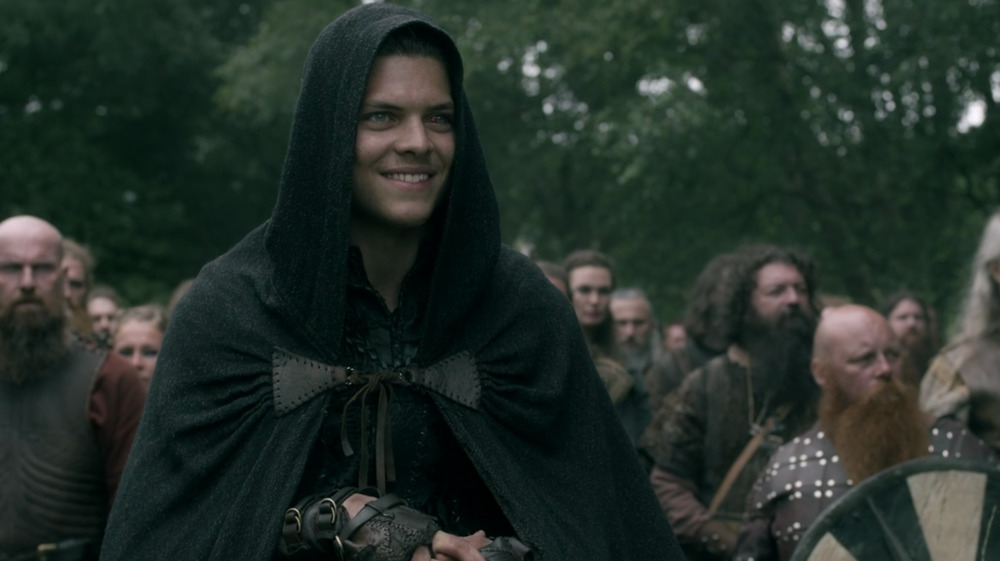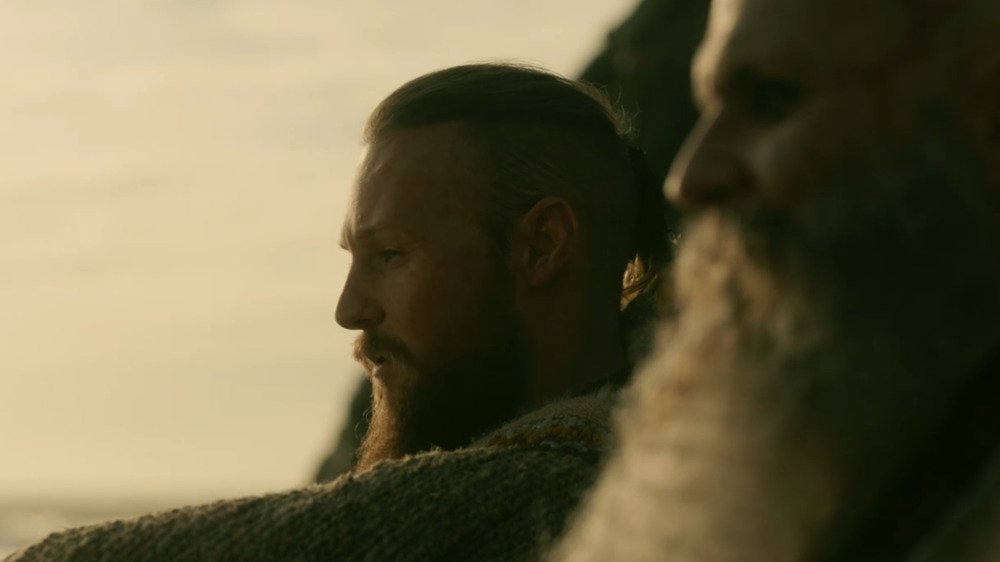The Ending Of Vikings Season 6 Explained
Contains major spoilers for Vikings season 6, part 2
The Viking Age — or should we say, the Vikings Age — has finally come to an end. The final shield wall has been formed, the last longship launched. Heroes have risen, fallen, and converted to Christ. In the end, perhaps the best thing we can say about the final ten episodes of Michael Hirst's genre-defining historical epic is that it went out fighting, with a sword in its hand. Perhaps we will binge the series again in the Corpse Hall in Valhalla.
Vikings' best days may be behind it, but the final set of episodes, released simultaneously on Amazon Prime Video on December 30, 2020, gave us a fitting resolution to a tale nominally carved from medieval sagas. The dangling storylines were all resolved with enough finality to leave fans satisfied, yet enough ambiguity to keep the Reddit boards firing until the planned sequel series arrives.
In the space of ten episodes we learned the fate of Bjorn Ironside (Alexander Ludwig), who was run through by his brother Ivar (Alex Høgh Andersen) in the finale of season 6, part 1 (he dies, but only after inspiring his people to repel the Rus); We reached a reasonable resolution to the entire Rus storyline, with the young prince returned to his kind uncle Dir (Lenn Kudrjawizki), and the maniacal Oleg of Kiev (Danila Kozlovsky) killed by his own nephew's hand; We also saw the short-lived triumph of King Harald Finehair (Peter Franzén), who fulfills a lifelong ambition to rule Kattegat (though he remains the only Viking who just cannot seem to get a date); Ubbe (Jordan Patrick Smith) discovers the promised Golden Land; Floki (Gustaf Skarsgård) emerges from an isolated treehouse; Ivar and Hvitserk (Marco Ilsø) return home from their extended side-quest; and — of course — King Alfred's (Ferdia Walsh-Peelo) Wessex fields another vicious raid.
It was a busy half-season, and everything builds toward its powerful conclusion. Season 6, episode 20, entitled "The Last Act," was truly a finale fit for Viking kings.
Here's the ending of Vikings explained.
War and peace in the Vikings finale
In some sense, "The Last Act" is a schizophrenic episode. It principally follows two groups led by Ragnar's (Travis Fimmel) surviving sons as they march toward diametrically opposed, but equally inevitable conclusions. Ubbe's crew, who spent much of the half-season floating on the vast and uncharted Atlantic Ocean with neither food nor water, is now settled in the Golden Land (clearly North America), where they've discovered both a helpful Native American tribe and an old friend, Floki the boatbuilder. After much suffering at sea, it appears that Ubbe and his crew might finally get the chance to live as farmers in a bountiful land with new neighbors who know nothing of the Viking way, but when Naad (Ian Lloyd Alexander) murders We-jitu (Phillip Lewitski) after breaking into his teepee in search of gold, the fragile peace between the two peoples is threatened.
On the other side of the sea, Ivar once again challenges Alfred of Wessex. After King Harald is killed in battle, Ivar assumes that the peace-loving Christian Saxons will have had enough of war. Under flag of truce, he and Hvitserk offer Alfred a typical Viking bargain: An exchange of hostages and land carved out of Wessex for the Vikings to settle, which in turn would buy a temporary end to the hostilities. Steeled by his wife's advice, Alfred refuses the offer, determined to purge the Pagan horde from his land once and for all. "You are a byword for terror all over this world," Alfred tells Ivar. "You do not see or feel the pity of ordinary mortals."
Though Ivar has the numbers, he sees the writing on the wall. He knows that he will die if he fights the Saxons again, and Hvitserk identifies that his brother's eyes have turned blue (like, full-on Fremen blue), an apparent sign that Ivar is about to hurt himself.
The Norns cut Ivar's thread, but Ubbe's stretches on
Ivar does, indeed, perish in the battle with Alfred. He goes down screaming the same challenge he first uttered in York during the revenge raid for Ragnar's killing. When a young Saxon soldier approaches him with a knife, Ivar nods, practically inviting the young, nameless Christian to send him to Valhalla. He dies in Hvitserk's arms, and Hvitserk is captured by the West Saxons. He converts to Christianity in exchange for his life, and takes the name Athelstan, a welcome nod to the Northumbrian priest and friend of Ragnar who perished all those seasons ago.
Unlike Ivar, who embraces the Viking way to his last breath, Ubbe renounces the brutality of Scandinavian law. After announcing his plans to cut the Blood Eagle into Naad as punishment for his crime against the Native Americans, Ubbe decides to instead show mercy. At the last moment, with both his crew and the tribe looking on, he abandons the barbaric ceremony and provides Naad with a quick, clean death. Its an interesting counterpoint to an earlier Blood Eagle, that Ragnar elected to complete on Jarl Borg (Thorbjørn Harr) after the half-mad rival leader attempted to have Ragnar deposed.
The dichotomy between the two sons of Ragnar couldn't be clearer at this point, and it serves Hirst's apparent thesis in the concluding season of his show: Ubbe abandons the old ways, and is rewarded with the opportunity to walk into a new age in a new land; Ivar clings to the old ways, and ultimately dies with them.
The two sides of Ragnar Lothbrok
So what does it all mean? In some sense, the two dueling narratives of the Vikings finale provide a meta-commentary on the violent Viking culture, as well as a eulogy for its golden heyday in the 9th century. As jarring as it often is lurching from frenetic battle scenes in Wessex to idyllic landscapes in Ubbe's Golden Land, the contrast provides important insight into Ubbe and Ivar, who both ultimately come to represent the two sides of their famous father.
Like Ubbe, Ragnar was a thinker and explorer who wanted to expand the edges of the map, and liked to think of himself as a farmer. He was fascinated by the Christian God, even though he never completely embraced a conversion. This side of Ragnar lives on in Ubbe. The eldest son of Aslaug is the cerebral leader to Ivar's pure Viking id. Like Ivar, Ragnar could also be wild, vengeful, and cruel. He was always a better raider than king, and gained most of his fame by pillaging Wessex and Frankia. He never got to be a farmer, and he ultimately sacrificed himself as a means to inspire his sons to take up arms in Wessex. He perpetuated the cycle of violence, even when he and King Ecbert (Linus Roache) might have found an accord born of an obvious mutual respect. Ivar meets the same end as his father on the same Saxon soil. When Ubbe tells Othere he finally found what Ragnar was searching for, he's right — though he misses the fact that Ragnar abandoned that search in favor of war. Ubbe finds it because he makes the choices that Ragnar didn't.
Vikings: Valhalla will likely return to Ubbe's Golden Land
In the final moments of the episode — and the series — we intercut between scenes of Ingrid (Lucy Martin) ruling steadily in Kattegat and the resolution in Wessex. With both Erik (Eric Johnson) and Harald out of the way, Ingrid appears to have solidified her control of Norway. She receives word of Ivar and Harald's deaths and Hvitserk's conversion, and she seizes the moment to eulogize the deaths of the great Viking heroes.
The final scene features Ubbe and Floki gazing out at the sea from under Native American blankets. For such a violent series, the choice to end on a quiet moment of camaraderie between two men who forsook the Viking way was a brave one, though it ultimately pays off, providing a satisfying bit of pathos and a deep breath after six seasons of utter brutality.
It also may have been intended to set up Michael Hirst's forthcoming sequel series, Vikings: Valhalla, set to take place a century later, and follow the next generation of Viking explorers to hunt for Ubbe's Golden Land.
So while we all look forward to that voyage, let us take a moment to lift a horn of ale and say skål to a truly singular series.
